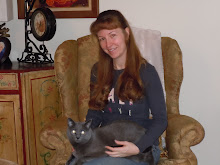While donning the leather boots and rough canvas jacket at the door, (His eccentricity extended not quite as far as his clothing; minus the artful avant-garde hair and the wedge-shaped jaw he closely resembled a Cabella's magazine clothing model, the tireless efforts of fashion wizards having succeeded even in the far-flung regions of mountain grandeur.) he was joined by Ebenezer.
These daily outings were among the few pleasures that stoked the flickering fires of the dog's stoic spirit. The solemn eyes quickened and the tongue lolled out, in between impatient glances up and down at the progress Joshua made lacing his boots and buttoning his jacket.
David Copperfield assumed a lazy, sour-grapes manner as he stretched across the leather armchair in front of the fireplace.
Joshua and Ebenezer stepped outside into an effulgent light that is produced only by the fusion of snow and sun.
However gently Joshua closed the door, the slight jar commenced a small avalanche at the top of the snow-laden blue spruce that stood beside the porch. Joshua stepped out of the way quickly, avoiding all but a little powder, but Ebenezer, the fresh air already oxygenating his wolf-blood, lunged off the six-foot porch and landed in a deep drift, muscles quivering and eyes expectant; mouth widening.
Joshua shook off his coat collar and shoved his hands in his coat pockets, starting down the stairs.
Ebenezer divined Joshua's plan for today's hike, and erupted out of the drift in a geyser of glittering snow and bounded for the lane far below.
He (Joshua) held to a revolving flight plan for their excursions. It was a rigid pattern that allowed for no indulgent deviations, no favorite paths, and its express purpose was to "absorb his natural surroundings." His fondness of nature matched his taste for classical music. Both were environment; background noise. Most of his likes and dislikes were rooted no deeper in his nature than Ebenezer's indoor stoicism was rooted in his. He chose to like and dislike what he felt he should like and dislike. He played Tchaikovsky in the Sony system not because he had ever really listened to the music closely enough to fall in love with it, but because it befitted a small mountain chalet, with a stone hearth, rugged furniture, and large windows.
However, he had lately taken to Vivaldi, having decided that perhaps Tchaikovsky was sometimes over-the-top. The drums and the horns blared melodrama, and he detested melodrama as much as he detested normality. He had forsaken Yanni, a few months back, for the same reason.
Up until something over two years ago, he had roamed the woods in an ATV. In the time since, his outings had taken a turn for the naturalistic. He'd let the four-wheeler go for $4,000, built a small breakfast nook on the end of the kitchen, and taken to walking.
Hiking trails didn't exist this far out, and if they had, they would never have been trod upon by Joshua. The road less traveled was something, in his mind, to be ever sought after. He preferred to plow through the unblazed forest slowly, without being manipulated by an established thoroughfare.
His course today took a southwesterly turn about a quarter mile down the lane. As usual, no open path lay before him, just a small break in the tree line. A four foot high rend in the undergrowth provided an opening underneath a leaning Ponderosa pine into which Joshua, preceded by the intuitive Ebenezer, ducked through.
A few hundred yards in, Joshua stopped and leaned against a thick pine to take in his surroundings.
It was an unrealized addiction, this insatiable thirst for woodland silence.
He grew still, relaxing against the tree, allowing his blood to slow, and his breath to moderate.
No birds, no wind stirred. Even the thrashings of Ebenezer had faded far ahead, muffled by the snow.
The sun had yet to penetrate and the snow hung heavy and frozen on the branches above.
Minutes passed.
His back against the tree, he slowly slid, his knees buckling, until he sat motionless on the ground.
His head tilted back and he gazed up through the spidery network of branches and needles.
Complete and utter quietude rose in his ears, growing to a roar.
Hearkening back to what he had written an hour before, he was unconsciously moved, unwittingly excited, by the stillness. The nothingness accentuated. . . . . .everything.
There was nothing here, nothing but himself. The distractions of daily hermit life peeled off rapidly, dissolving into the smothered forest.
"Dear friend," a letter to Mothers in waiting...
9 years ago
